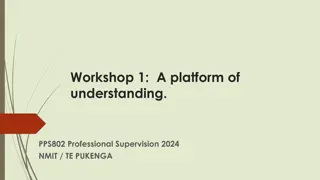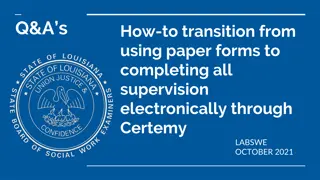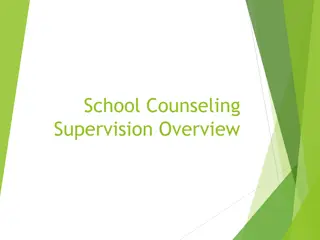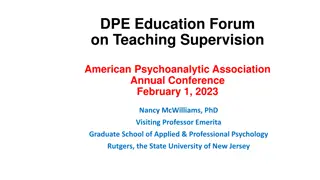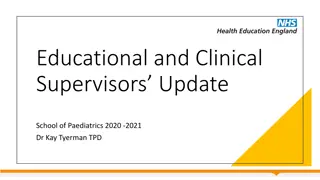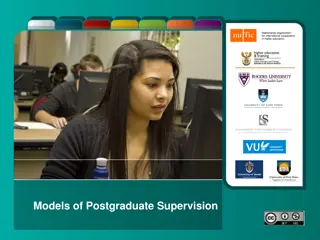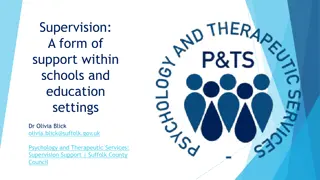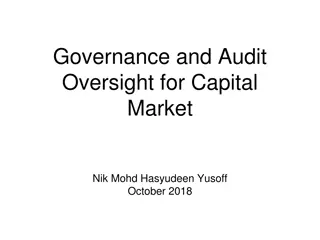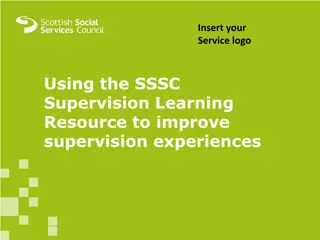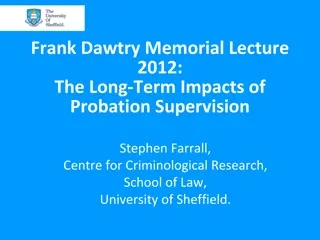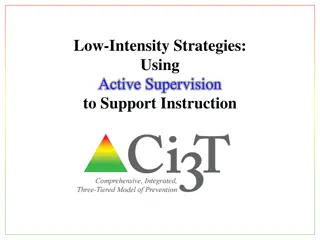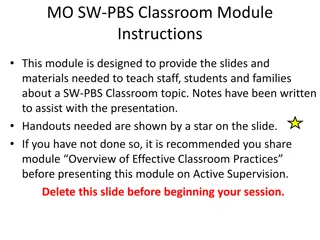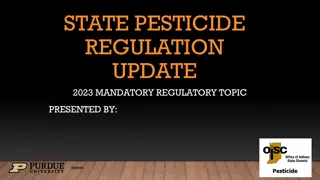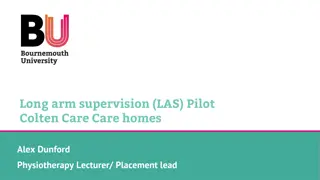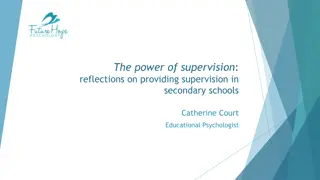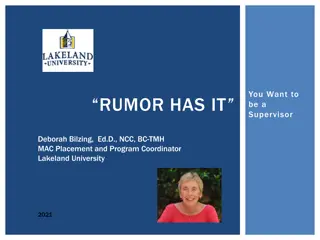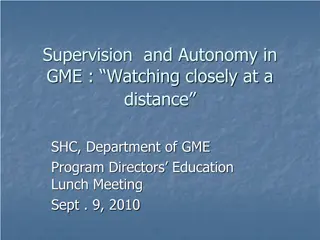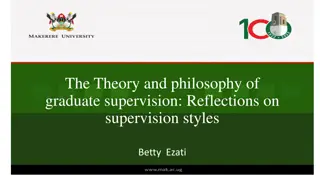Understanding OSEP QA 23-01 and State General Supervision under IDEA
The U.S. Department of Education released OSEP QA 23-01 to guide state and local education agencies in fulfilling responsibilities under the Individuals with Disabilities Act. General supervision systems are essential for improving educational outcomes and ensuring compliance with IDEA requirements. A well-designed system includes integrated monitoring activities, data management, fiscal oversight, targeted technical assistance, and more. State educational agencies must monitor factors like FAPE provision, transition services, dispute resolution, and equitable IDEA implementation through various monitoring activities.
Download Presentation

Please find below an Image/Link to download the presentation.
The content on the website is provided AS IS for your information and personal use only. It may not be sold, licensed, or shared on other websites without obtaining consent from the author. Download presentation by click this link. If you encounter any issues during the download, it is possible that the publisher has removed the file from their server.
E N D
Presentation Transcript
SEDLA July 2024
What is OSEP QA 23-01 The U.S. Department of Education, Office of Special Education and Rehabilitative Services released the State General Supervision Responsibilities Under Parts B and C of the IDEA (OSEP QA 23-01), a comprehensive guidance package intended to better inform state and local education agencies of their responsibilities under the Individuals with Disabilities Act (IDEA). This guidance will inform CDE s responsibilities for general supervision, monitoring, and providing technical assistance to ensure a Free Appropriate Public Education (FAPE) for Students with Disabilities.
What is general supervision? As a condition of receiving IDEA funds, the State agency must have a general supervision system. This monitoring system must include monitoring to: improve educational results and functional outcomes for children with disabilities; and ensure that LEAs meet the requirements under IDEA; ensuring that the State has a system that collects and reports valid and reliable data. SEAs must make annual determinations about the performance of each of its LEAs and enforce Part B requirements.
What are the necessary components of a reasonably designed State general supervision system? Integrated monitoring activities Data on processes and results The SPP/APR Fiscal management Effective dispute resolution Targeted TA and professional development Policies, procedures, and practices resulting in effective implementation Improvement, correction, incentives, and sanctions.
What must the SEA monitor? The provision of FAPE in the LRE Child find A system of transition services The use of resolution meetings Mediation Disproportionate representation The equitable implementation of IDEA, through examination of local policies, procedures, and evidence of implementation (or practices)
What are monitoring activities? Interviewing LEA and local program staff Reviewing local policies, procedures, and practices for compliance Conducting interviews and listening sessions with parents of children with disabilities, children with disabilities, and other stakeholders Analyzing local child find data Reviewing information collected through the State s data systems relating to local compliance with IDEA requirements Examining and evaluating performance and results data on specific IDEA requirements Analyzing assessment data to determine if the data represent improved results for children with disabilities Evaluating policies, procedures, and practices for fiscal management Examining information gleaned from the State s dispute resolution system
What are a States responsibilities for ensuring compliance with IDEA and OMB Uniform Guidance requirements? The OMB Uniform Guidance requires SEAs and LAs as Federal grantees to conduct monitoring. As a recipient of a Federal grant award, SEAs are responsible for oversight of the operation of Federal award-supported activities. The SEA must monitor activities under the Federal award to ensure compliance with Federal requirements.
What else does the OMB require? Evaluate each subrecipient s risk of noncompliance with Federal statutes, regulations, and the terms and conditions of the subaward to determine appropriate subrecipient monitoring; Monitor the activities of the subrecipient as necessary to ensure that the subaward is used for authorized purposes, in compliance with Federal statutes, regulations, and the terms and conditions of the subaward, and that subaward performance goals are achieved.
May States limit their general supervision activities to only the IDEA requirements included in the State s annual SPP/APR? No. An effective general supervision system should, at a minimum, include the eight components identified above, only one of which is the SPP/APR. Some requirements related to the fundamental rights of children with disabilities and their families are not represented in the indicators.
Is fiscal monitoring a required part of IDEA monitoring? Yes. The IDEA general supervision responsibilities include fiscal monitoring. SEAs must monitor IDEA Part B fiscal requirements such as the LEA s compliance with IDEA s maintenance of effort provisions and the LEA s expenditure of a proportionate share of IDEA funds to provide equitable services to children with disabilities placed in private schools.
What role does the information from the States dispute resolution system play in a State s reasonably designed general supervision system? In reviewing complaints and decisions, a State may be able to identify patterns that suggest systemic noncompliance by one or more LEAs with IDEA requirements or suggest that there may be State-wide patterns of noncompliance. Where such patterns are present, the State, as part of its general supervision system, must determine whether systemic noncompliance occurred or is occurring and ensure correction in a timely manner.
What are a States general supervision responsibilities for addressing significant disproportionality? Each State that receives assistance under Part B of the IDEA must provide for the collection and examination of data to determine if significant disproportionality based on race and ethnicity is occurring in the State and the LEAs of the State with respect to: The identification of children as children with disabilities The placement in particular educational settings of such children The incidence, duration, and type of disciplinary actions, including suspensions and expulsions.
Which educational programs, agencies, institutions, organizations, or EIS providers must a State monitor to fulfill its general supervision responsibilities? SEAs monitor the subrecipients of IDEA funds, which can include LEAs, public charter school LEAs, and programs operated by other State agencies, such as correctional agencies. The subrecipients are responsible for the general supervision of schools or programs within their jurisdiction.
How frequently should a State monitor its LEAs? A State should monitor all LEAs or EIS programs and providers within a reasonable period of time and at least once within a six-year period. Where LEA data or other available information indicates an area of concern, a State should consider whether more frequent or targeted monitoring.
How should a State make its monitoring cycle and results available to the public? A State should inform stakeholders, including parents of children with disabilities and children with disabilities, about its general supervision systems and monitoring activities. This could include making available to the public monitoring schedule, including the names and number of monitored in a given year, the results of those monitoring and any additional targeted monitoring activities.
Is a State required to exercise its general supervision authority during disasters (e.g., human-made, health-related, or natural)? Yes. Even during disasters, SEAs must ensure the requirements of IDEA Part B are met and ensure the implementation of IDEA Part B.
What is an area of concern? An area of concern means a credible allegation regarding an IDEA policy, procedure, practice, or other requirement that raises one or more potential implementation or compliance issues, if confirmed true. Such credible allegations may come from integrated monitoring activities, data reviews, grant reviews, stakeholder calls, media reports, dispute resolution systems, or other mechanisms that relate to IDEA implementation.
May a State use a threshold of less than 100 percent compliance when determining an LEA compliance with IDEA requirements? No. A State may not establish a threshold of less than 100 percent for determining an LEA s compliance. If a State determines an LEA s compliance level is less than 100 percent, the State must issue a finding and require correction of the noncompliance
What actions must a State take when made aware of an area of concern with an LEA s implementation of IDEA? A State must conduct proper due diligence when made aware of an area of concern regarding an LEA s implementation of IDEA and reach a conclusion in a reasonable amount of time. If the State determines that the LEA is out of compliance with an applicable IDEA requirement, the State must issue a written notification of noncompliance.
HB24-1063 ABBREVIATED SCHOOL DAYS Definition of an abbreviated school day Circumstances in which abbreviated schedules are permissible and impermissible Roles of the teams who determine whether to assign children with disabilities to abbreviated schedules Notice requirements that children with disabilities must not be excluded from field trips, school functions, and extracurricular activities due to abbreviated schedules Documentation and maintenance of records relating to children with disabilities' abbreviated schedules Review of abbreviated schedules on a regular basis by the teams who determine whether to assign children with disabilities to abbreviated schedules Information that parents, legal guardians, or custodians of children with disabilities (parents) must receive regarding whether parents may consent to, revoke consent to, or oppose abbreviated schedules Procedural safeguard information distributed to parents prior to meetings in which abbreviated schedules are discussed. 22
SB 24-069 Clarifying Individualized Education Programs This bill requires CDE to create a training program that includes easy to understand explanations of federal and state laws and procedures related to individualized education programs, including parent and student rights. On or before July 1, 2026, the training must be provided in person and made available online. CDE must collaborate with stakeholders to create the training. CDE is encouraged to collaborate with, at a minimum, parents of students with IEPs, teachers, persons with disabilities, district representatives and members of the public. 23
Proposed SBE Rule Making
SBE Rule Making Activities Abbreviated School Days Rules that are result of HB24-1063 OSEP Requirements Procedures for State Complaints & Clarifying CDE as a public entity subject to due process complaints or state complaints AU Reorganization Rule regarding how a district can become an AU 25
Questions Paul Foster, Ed.D. Assistant Commissioner, Exceptional Student Services Email: Foster_p@cde.state.co.us Text: 720-660-4253



